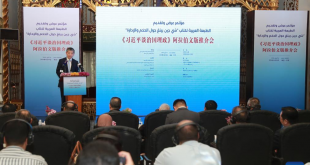Published: January 01,2023
By Kirtan Bhana

CFP
Amid the complex geopolitical landscape and seemingly insurmountable challenges facing humanity, there exists a parallel narrative of hope and progress. While conflicts in the Middle East, power struggles between East and West, climate change disputes, and other issues dominate headlines, it is crucial to recognize the quantum strides humanity has made through interconnectivity, solidarity and technological innovation. This optimistic view of 2024 we are entering is emphasizing the transformative potential of our interconnected world.
Interconnectivity and global solidarity
In times of crisis, such as natural disasters or health emergencies, the world has witnessed remarkable displays of solidarity, with nations and individuals uniting to offer support and assistance. The immediate and overwhelming response by countries around the world to the devastating earthquakes that struck Türkiye and Syria in February this year is a clear indication that political and ideological differences are easily set aside in times of disaster.
Rescue teams, medical, food and other support supplies were dispatched in times of humanitarian emergency. In September, rescue teams arrived in Libya amidst severe flooding caused by torrential rain that caused a dam wall to break open. The human tragedy, pain, and suffering could have been significantly less if the situation in those countries had not been exacerbated by futile and unnecessary human-made conflicts.
Technological advancements and innovation
Technological progress has been a driving force behind positive change on a global scale. Breakthroughs in medicine, renewable energy, and artificial intelligence (AI) are transforming the way we live and interact with the world. Innovations in healthcare, for instance, have led to the development of vaccines and treatments that can address not only current challenges like the COVID-19 pandemic but also future health threats.
The application of technology in education, agriculture, and sustainable development is creating opportunities for shared prosperity and knowledge transfer. China has certainly taken the lead in implementing alternate energy solutions and efficiency through design. The 19th Asian Games held in Hangzhou and the 31st FISU Summer World University Games held in Chengdu was a showcase of the inventions and designs of clean and green energy and the great strides China has made, playing its part in mitigating climate change.
Climate action and environmental stewardship
While climate change remains a pressing issue, there is a growing global awareness of the need for environmental stewardship. The international initiatives for a just transition are a collective commitment to mitigating climate change and transitioning toward sustainable practices. Advances in new energy technologies, increased adoption of electric and hydrogen power, and efforts to reduce carbon emissions are indicative of a shared determination to protect our planet for future generations.
The United Nations Conference on Environment and Development (UNCED), also known as the “Earth Summit,” was held in Brazil in 1992. It was in response to the euphoria that marked the end of the Cold War and the beginning of collaborative and cohesive global cooperation and international relations. Three decades later, the reality and urgency for action were laid bare at the 28th meeting of the Conference of the Parties to the United Nations Framework Convention on Climate Change (COP28) in the United Arab Emirates (UAE). A greater understanding of joint and collective responsibility is imperative in the face of a changing climate and unstable and irrational geopolitics.
The 28th session of the Conference of the Parties to the UN Framework Convention on Climate Change is held in Dubai, United Arab Emirates, December 2, 2023. /CFP
Multilateral cooperation and diplomacy
Despite geopolitical tensions, there is recognition of the importance of multilateral cooperation in addressing global challenges. International organizations like the United Nations, regional alliances, and diplomatic initiatives play a crucial role in fostering dialogue and finding peaceful solutions to conflicts. While issues persist, the fact that nations continue to engage in diplomatic efforts reflects a commitment to resolving differences through dialogue and negotiation, rather than resorting to armed conflict.
The Israel-Palestine conflict, which has been ongoing for several decades, needs a harsh dose of reality if the world is to rid itself of its addiction to this “insane war.” It appears that this battle has always been beyond the realms of religion as has been portrayed, to keep the world distracted and is used by world powers to exercise influence, especially for economic and military control. It seems that the latest outbreak in Gaza is bringing about a change of perspective as the truth of the situation becomes clearer, and an apparent solution linked to the re-interpretation and acceptance of history and the current circumstance starts formulating.
Media plays a crucial role in shaping diplomatic relations by offering a platform for nations to communicate directly with global audiences. Digital diplomacy leverages social media, online forums and virtual summits to facilitate dialogue and transparency. This direct engagement fosters a sense of accountability and openness, challenging traditional power dynamics and promoting diplomacy that is accessible to a global audience.
While celebrating the positive influence of media, it is essential to acknowledge the challenges it faces. Misinformation, disinformation and sensationalism can undermine the potential for positive change. The embedding of journalists in the Iraq war and the failed NATO military operation in Afghanistan is being repeated in the Ukraine-Russia conflict. Responsible journalism becomes paramount in navigating the complexities of the information age, emphasizing accuracy, impartiality, and ethical reporting to ensure that media remains a force for good.
While acknowledging the challenges humanity faces, it is crucial to embrace the optimistic view when we are entering 2024. Interconnectivity, technological advancements, environmental stewardship, diplomatic efforts, space exploration and social movements all contribute to a narrative of progress and shared aspirations.
The interconnected world we live in presents opportunities for collaboration, understanding, and collective problem-solving. By focusing on these positive aspects, we can work towards building a future that reflects the best of human potential – a future characterized by cooperation, innovation and a commitment to the well-being of both the planet and its inhabitants. As we navigate the complexities of our time, the golden age beckons us to harness the transformative power of unity and optimism for a brighter, more inclusive future.
Kirtan Bhana, is a special commentator on current affairs for CGTN, is the founding editor of the Diplomatic Society of South Africa
cgtn.cn
 Africa -China Review Africa -China Cooperation and Transformation
Africa -China Review Africa -China Cooperation and Transformation
